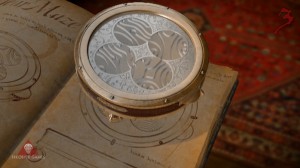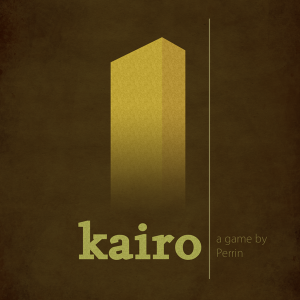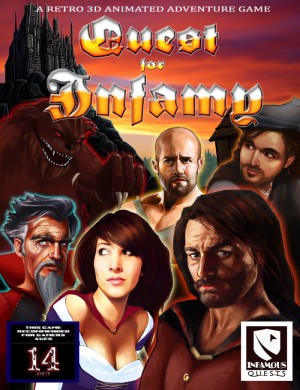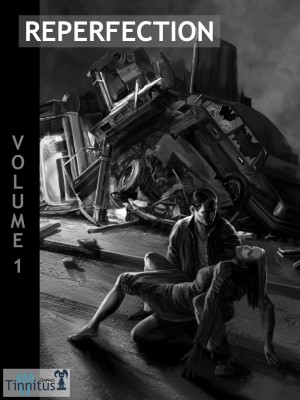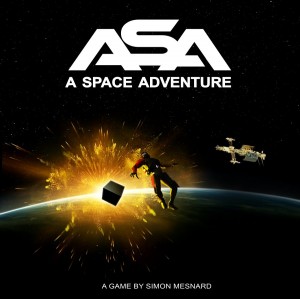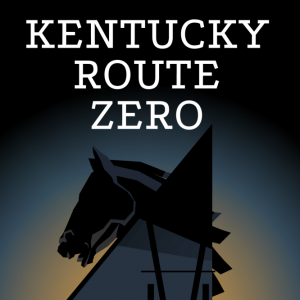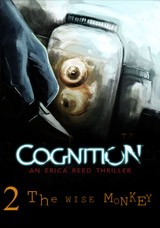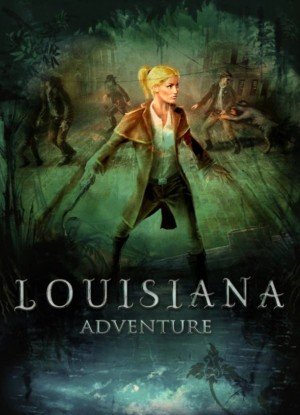David Wheeler - The 7th Guest 3 interview - page 3
Though he's known as a pioneer of interactive storytelling to adventure fans of The 11th Hour, Tender Loving Care, and Point of View, writer and director David Wheeler has also been busy making AAA games such as Ghostbusters and Medal of Honor in recent years. Now the Kickstarter campaign for The 7th Guest 3: The Collector has finally brought back the old Trilobyte dream team of Wheeler and Rob Landeros. The occasion gave us an excellent reason to chat with Wheeler about his lengthy career and his involvement with the new game. As we discovered, the man who may have helped paved the way for companies like Quantic Dream and Telltale not only has a lot to look back on, but also a lot of ambitious plans for the future.
Ingmar Böke: Hello, David! I did an interview with Rob Landeros last year, and of course I asked him if you would ever work together again, as it's no exaggeration to say you were a dream team of interactive storytelling back in the day. At the time it seemed very uncertain from what he said that it would happen. How did you get back together again?
 |
David Wheeler working on a 35mm camera for Trilobyte's interactive movie Tender Loving Care
|
David Wheeler: Well, for many years we tossed around the idea of doing a third sequel or third version of The 7th Guest. We actually started up a version of it in, I think, 2003 maybe. We mapped out the original concept for The Collector. But it was hard getting things going in those days because most publishers were pushing away from FMV and the cries that “FMV is dead” were pretty well heard and it was like a self-fulfilling prophecy. And Full Motion Video was the sort of central part of our work and without it, it was very difficult.
Honestly, we not only had The 7th Guest part 3 but we had been developing another totally different, very unique story and I really could not get any publishers interested. People loved our work. Several publishers, some of them who I later worked for, told me almost the same thing. They would say: “David, you just have to get it through your head. People will never, never want to watch movies on their computers.” (And of course now we are watching them on our phones; that’s changed quite a bit.)
So we died off back then with the concept of doing The 7th Guest part 3 and Rob and I went in different directions. We had started our company in Canada, which was Digital Circus, and we produced Point of View there. And then I got kind of fed up with publishers and I kind of quit the game business completely. Rob went into expanding his web design business and I went in a very different direction. I did a very large project, which was a science museum, and I did 88 interactive exhibits for a science centre and it was very well received. It took me quite a while to do that but what I did was bring a lot of my story-oriented thoughts to displaying and explaining science and it was quite successful. Then I did some human rights work for a couple of years, basically again using my interactive experiences.
Then I got totally back into the game business; I was seduced back by a very good friend of ours. I became content director for Vivendi and oversaw all of the content, especially from a story point of view, for Sierra and Vivendi Universal. Then I went to Electronic Arts and was a creative director there and I was invited to create a new IP. They didn’t want to do an interactive movie, but they wanted me to create a shooter game. That was fine; by that time I had a lot of experience in that sort of thing. I pitched an idea based on a book idea of mine and they really liked it, so we developed it for a while but then the economy went sour and they decided they didn’t want to do any new IP. So they asked if I’d work on Medal of Honor – this was 2009. So I worked on bringing it from World War II to modern day and it was very successful; I think it almost tripled the sales from the previous instalment. But I left before it was finished; I sorted out all the story stuff and the cinematics and so forth.
 |
Wheeler (R) has reunited with longtime collaborator Rob Landeros to develop the third part of The 7th Guest series, 'The Collector' (The Mail Tribune, September 28, 1997; Jeff Barnard, photographer) |
Anyway, the impetus to get back together with Rob really started when he restarted Trilobyte Games as his own company and put out The 7th Guest and the The 11th Hour (on iOS). The 11th Hour was the first video game I directed then and I was working with Rob; he was of course the designer and that’s how we first met and got along so well together. Anyway, he was releasing those and he approached me with the idea “What about doing Tender Loving Care?” because although I directed The 11th Hour, I have no ownership of that. That was all Trilobyte Games, whereas with Tender Loving Care, Rob and I own that together.
So we collaborated a little bit on that; his company did all the work and I just sort of kept an eye on it and did a little bit of consulting on it, and I knew he was brewing this idea of doing The 7th Guest part 3. We were not physically in the same place – I was in Los Angeles, he was still in Oregon, but we started talking about 7G3 and he asked me if I would take part in this. We were talking about doing some story and some live action and I agreed, so I’m on basically as the writer/director of the project. That was a long answer to your question.
The 7th Guest 3: The Collector Kickstarter trailer
Ingmar: That’s alright, it was very interesting. The Kickstarter campaign has been running for a while now. How satisfied are you so far with the crowdfunding?
David: You know, honestly, Ingmar, I have not been able to pay any attention to the campaign at all. That’s only because I just took a new job and I started this week on Monday. There was a lot of prep before and stuff. So I’m now the director of the Media Sandbox at Michigan State University. Michigan State is a huge school with 50,000 students. A couple of years ago they came up with this idea, which I thought was a brilliant idea, to integrate their media arts program and created this thing called Media Sandbox. So they’ve been working on it for a couple of years and what they really needed, because it was run by people who were already there – academics and professors and so on – was someone with what they call "real world experience". It’s quite a beautiful program that combines cinematic arts, game design, journalism and advertising, and as it turns out I have done all four of those things professionally with a certain amount of satisfaction. They did a search for the right candidate and they ended up hiring me.
So I moved to Michigan on Saturday. And I have hardly had time to have a meal I’ve been so busy. I did talk to Rob yesterday for a little bit. The Kickstarter is moving along as far as I know. I hope people get to see it, because it would be a fantastic game, in my opinion. I personally know some people who have gone to Kickstarter with less important projects who have gotten a whole bunch of money. I think this project is important because The 7th Guest was a seminal game for the computer game business. Let’s hope that word gets out and it gets spread and they get at least the minimum amount of money.
Ingmar: The last time I looked, it still had a fair way to go to reach its goal, but there's still time left so anything can happen. To get back to the actual game, it feels to me that the Stauf mansion is one of the main characters of The 7th Guest 3 in the same way that Hill House was in The Haunting. Can you tell us a little bit about this special "character" of the game and its peculiarities?
Warning: The following paragraph contains spoilers about the end of The 11th Hour.
 |
Robert Hirschboeck plays Henry Stauf, the main antagonist of the series
|
David: That’s a very astute observation. The Stauf mansion is in fact a character. In the first game it was the cover shot. It is important and we decided that it would be something larger than life. I mean, we burned it to the ground at the end of The 11th Hour, but that’s only in that version of that story. The Stauf mansion exists as an entity of its own. We think of it as a timeless entity with parallel universes and all that stuff, so the mansion has been refurbished so to speak. It’s contemporary now; even though it’s a Victorian mansion it’s a contemporary build. But for the story we are reaching back to the original 7th Guest instead of going current day, so it has the sort of magical quality that we are looking at it like the mansion itself is contemporary but the characters are still based from the 1930s onwards. And of course it's getting from one place to the other, working your way through the mansion that opens up the story, and to get there you have to solve some clever puzzles.
Ingmar: There is a quote on the Kickstarter page: “This game is intended for a mature audience. The 7th Guest 3 is all grown up and everywhere we go we will explore new territory. Territory we couldn’t touch in The 11th Hour in the '90s”. Could you please elaborate on that? What exactly do you mean by that statement?
David: I don’t know that I can tell you exactly what we mean by it, because I can’t tell you exactly what we’re going to have in it. But we have definitely battled a little bit. Rob and I have definitely pushed the boundaries of adult entertainment. But it’s not "adult entertainment" in the sense of pornography; we are not interested in that at all. What we are interested in is recognising the fact that there are people who watch movies and accept all kinds of situations that are made for grown-ups, but somehow people think that games are for little kids. We know that they are not. We know that they are much more sophisticated. Many games push violence beyond what you can see in movies. It’s astonishing how far games have pushed that sort of thing.
 |
The 11th Hour CD-ROM cover, US version |
We’ve never been very interested in violence, it’s not something we’ve focused on, but we have focused on human relationships and our characters are adults, so we definitely had to battle a little bit with some puritanical thoughts and feelings. We didn’t really suffer from censorship because nobody was really censoring us. If you’ve seen Tender Loving Care, you'll know we pushed the boundaries there, I think in a humorous and tasteful kind of way. That was always our ambition. We struggled a little more with The 11th Hour, because it was boxed as a game on CD-ROM. Even though Tender Loving Care was also that way in Europe, it was not distributed much as a CD-ROM over here in North America. It was primarily sold as a DVD video, which made it seem more like a movie and it was only available in stores where you buy movies.
It wasn’t reviewed very much in games magazines, although I have to say that we actually got some perfect Metacritic-type scores. People would give it 100, but we also got scores that were abominably low, 30 or something. Because there were people who would say “Hey, this isn’t even a game! It’s just some kind of attempt to make a movie or something!” and we were accused of being game-makers who were wannabe filmmakers, and it was really the opposite. I was a filmmaker long before I was a game-maker.
So to get to the point of your question, I’m sure we will deal with those sorts of things that people will object to again. But we are our own publishers this time, so we don’t have to worry about those people who worry about their impression with the public because they think their other games aren’t going to sell or something. We can basically do what we want, though we’re still limited somewhat. There is still a form of censorship out there in the form of distribution. You have to tailor your products. We definitely had to modify Tender Loving Care somewhat just to get it through iTunes, and I’m sure we’ll have to deal with that kind of stuff this time as well. But I can promise you it’s going to be fun, and if you’re a grown-up person with a relatively mature mind, you’ll probably have a great time playing this game.
 |
In the foyer of the Stauf mansion in The 7th Guest 3 |
Ingmar: You said how groundbreaking The 7th Guest was back in the day. I remember my uncle had a new CD-ROM drive. I was about 11 when I saw that game on his computer and I couldn’t believe what it was, because it was so different from anything I’d seen before. It went on to create a kind of sub-genre of its own, because there are all sorts of casual games now with haunted houses that are sort of copying The 7th Guest formula. Some even have short FMV clips. Isn’t it difficult when you have all these small games copying The 7th Guest to stand out and tell people this is different? How are you planning to show you’re still ahead of the rest?
David: That’s an interesting question. It’s really a marketing issue and the perception of it. Since we aren’t associated with a big publisher – at least we’ve chosen not to do that yet – getting the word out will be more of a grassroots thing. When I was at Vivendi, one of the last games I did there was the new Ghostbusters. There had been many Ghostbusters games, pretty well all of them failures. That can be daunting, and they didn’t know. They were taking a chance. “We are doing a new Ghostbusters.” But we did the right thing. We went back and we got the real guys, Dan Aykroyd and Bill Murray. When it came out people knew, “Oh yeah, this is really the Ghostbusters.” So it was quite successful.
Hopefully people will know when The 7th Guest 3 comes out that these are really the haunted house masters. We’re hoping that happens and that’s the perception of it. I think it will be; it should be known that there is a legacy to the genre and that we helped create that – I say we, though I personally did not have anything to do with the original 7th Guest; I only came in later.
Ingmar: One consideration for Kickstarter adventures based on a popular IP from the old-school days is that adventure games have changed quite a bit. They have become more approachable in terms of simplified mechanics compared to the early '90s. Is that something you are going to pick up in the new game and have a look at a new audience or are you going to say this is as old-school as it gets?
David: This is not a remake of The 7th Guest. This is a totally new concept of the same game. There was one very difficult puzzle in The 7th Guest. In The 11th Hour there were some that were virtually unsolvable. I just can’t agree with that. It shouldn’t be that difficult. I don’t know much about the final format for the new game. Rob knows much more about it. But I think we’re doing it primarily for tablet and we have to think in those terms, of how to get through puzzles without them having to be too complicated. The first little samples I’ve seen that they’re creating are very beautiful, and I think the beauty of the puzzles and the flowing music and the cleverness of them, without them being tear-your-hair-out impossible, is good. The gameplay should be stimulating but it should be pleasurable. You should not be stuck in something in which you have to do 90 consecutive moves.
 |
Puzzles of The 7th Guest 3 are being designed to be clever and engaging, unlike the overly-complex ones of the previous instalments |
Ingmar: Rob said he was not too fond of the quality of the FMV and the acting in The 7th Guest. You were not involved in that game, and there was a huge step forward in quality when you took over with The 11th Hour. But some people are still leery of the new project because they don't think the FMV in The 7th Guest was that good. Perhaps this is a good chance to assure people that The 7th Guest 3 is going to be much better in that area.
David: When Rob and Graeme (Devine) started out with The 7th Guest and it evolved into the whole FMV portion of it, they had isolated themselves a bit up in a small town in Oregon. Which was idyllic and great and let them create all the gameplay they needed to, but they did not have the resources to create high-level FMV. The new game will be very different. If you look at the advancement in the way we went, the whole reason that they approached me to direct The 11th Hour was exactly that: because the FMV was not up to scratch. At that time it was one of the first games to have live actors, so it was a bit of a phenomenon, but it wasn’t very well executed. So The 11th Hour was very different.
If you look at Tender Loving Care, especially the new version on iPad, it’s just gorgeous. It’s Full Motion Video like no one has ever done in a game before. That’s what this will be like. It will be with live actors. It will be with the most current digital cinematography, and I am intending to work with the same director of photography as TLC.
To be honest, when they did the FMV for The 7th Guest, they shot it upstairs above a restaurant; they used a roll of blue paper like photography paper to have the actors work against, and they shot it with a low-resolution camera. It was really a whole different sort of thing, with no knowledge really to put together something that would be easily digitised.
When we did The 11th Hour, I sat down with Calvin Kennedy and said “I want this to look like a Vermeer painting.” So I looked at a whole bunch of Vermeer paintings and we found a common ground between us as to how we should approach this and what it should look like. We set out to use beautiful photography with very natural looking light, and I think we were quite successful with it. We’ll certainly be doing something similar to that with The Collector. We’ll work at it from a very artistic point of view and we’ll have very good actors. The FMV will be spectacular. Guaranteed!
Ingmar: How did you first get involved with Trilobyte back in the day? I believe you did not have a game industry background; in fact, you were directing on TV at the time.
David: How it happened is a story that’s interesting even to me. I had not played games at all. My experience of games was like Pac-Man and Pong. I never really felt I had the time to play games and was not that interested.
 |
David Wheeler on a shoot
|
I had purchased a summer home in Oregon, a vacation property essentially that we went to several times a year. This was in Ashland which is next to Medford. We decided to move there permanently in the summer of 1992, and I had just come off a TV series for which I was the head writer and had directed half the shows. I was pretty exhausted and I was ready to take it easy for a little bit. I started to do some writing at the time for movies, so Oregon sounded great to me. So we moved up to Ashland, and the first week I was there I was reading the local newspaper and it said there was a meeting of the Southern Oregon Film and Video organisation that next week.
I decided to go to it just to see what was going on there. Quite coincidentally, Rob and Graeme were presenting The 7th Guest. It was a work in progress. They started showing us stuff and I had the same feeling you did when you first saw it. “I’ve never seen anything like this! This looks like a movie!” This moving camera glided down the halls of this fantastic old mansion and it just looked so beautiful. So I met them and there was a very good producer in town whose name is Harold Schreiber. He currently heads up the film and television program for Southern Oregon University. He and I connected and lo and behold, a month or two later he came to me and he had a budget and a script and he said “Hey, you know those guys that we met that night? They want to do a sequel and they are interested in having us do it”.
That was Harold’s company, and he said, “Would you consider directing it?” I read the script and I sat down with Rob and said: “I can do this if we do certain things with it.” We all got along great and that was that. I didn’t know anything about games but did know about the video portion of it and telling the story and working with actors and all that kind of stuff. I got a little bit involved and I created this idea that ended up being the interface for the game with the video device that is established early on.
That is how I got started and I worked there on a single contract deal. I worked on Matthew’s script a little bit and then I directed the video. I was interested in doing my own thing and I had a deal to make Tender Loving Care as a movie, not an interactive product at all. So we started working on that and casting it and, as often happens in the entertainment business, it fell through. So I had my hands on this script that I had written and I was trying to start my own interactive company in partnership with Trilobyte. They agreed to share their technology with me and then they just said: “Why don’t you just come and join us?” So I did, and among the things we ended up doing was TLC. I was an employee at Trilobyte but it was having its own problems and Rob ended up leaving, so we formed a new company together and we finished Tender Loving Care there, and then we opened up a company in Canada and we did Point of View.
Ingmar: There’s always been this old stereotype that the acting is so bad in interactive movies, but you have proved that doesn’t have to be true at all. Unlike many other FMV productions, the acting has been great in your projects. In Tender Loving Care, all the performances were very good but the one that stood out for me was John Hurt, and I was wondering how it was working with him on set.
 |
TLC DVD cover featuring John Hurt as Dr. Turner
|
David: It was very interesting. Tender Loving Care still had a very low budget comparatively and we didn’t have a lot of money for name actors, so we spent a lot of time casting for the parts. We did look at a few people to play Dr. Turner. But I really wanted to get someone in there who could be attractive. So we decided to see if we could spend some in this one area beyond new names and scale actors.
So we put the word out and worked with the William Morris agency and they suggested several actors that were really, really good. Among them was John Hurt. I said “Oh my god, let’s see if John Hurt would do this.” Don’t forget, this wasn’t too long after Elephant Man, and that was one of the all-time great performances in a movie, so they sent him a script and he agreed to do it. We scraped together the funds to get him over here.
Working with him was fantastic. As you know, he is very, very good in the game and we got along great. One of the things that has always worked to my benefit, I think, is that I’m not really very enthralled with celebrities. They are just people like the rest of us. We are just all human beings. So I don’t get over-excited about working with famous people, and I’ve worked with people much more famous than John Hurt, and they are just people. They are actors and they have the same kinds of needs that any other actor might have. If you can provide the sort of environment for them to do their thing in, it’s no different working with John Hurt than with someone who has never done a movie before. The difference is that every word that comes out of John Hurt’s mouth is great.
I remember the very first scene we did with him is when he drives up to the house at the beginning, gets out of his car and starts talking to the camera. It was just so fantastic hearing those words I had written coming out of his mouth. It was so good. Just a funny little side story to that: We had this fancy sports car for him to drive and of course it was a stick shift, not an automatic, and he didn’t know how to drive a stick shift so he had to come up to the hill and stop in front of the house. He had no experience with it. He didn’t quite know how to bring it to a stop or get it started so one of our guys was down at the bottom of the hill helping him get it started. What we did was put up a bunch of sandbags and several grips to catch the car when he stops. He brings it to a stop and you can’t quite see that because it’s off camera, they are all just grabbing the car. But he still manages to get out of the car after that nerve-wracking experience and turn to the camera and he’s brilliant. That just says something about actors. They can do anything under any circumstances.
 |
David Wheeler (L) with John Hurt (second from left) on the set of Tender Loving Care
|
Ingmar: TLC was groundbreaking in the way it dealt with sexuality. You mentioned you got censored in the App Store. What happened with that version? Did you get a lot of problems over the nudity or was that okay?
David: Our most successful version of Tender Loving Care was actually in Germany. There is no question, I think, that Europeans in general and possibly Germans in particular are more capable of dealing with this sort of thing than American audiences are. We had no trouble at all with Europe. Nobody even mentioned it. We got great reviews. Even the London Times gave it 9 out of 10. But by the time we were there, Trilobyte had fallen apart basically and we didn’t have a normal distributor and people were afraid of us. Afraid of our risk-taking.
The main release in America was on DVD. It was a whole new version that we did. We applied all our CD-ROM technology to what we could do on DVD and it was amazing. We had a very small distributor. DVD International was a very small company and they were able to get it out, but they didn’t have the big bucks to really promote it. But there was no negative return from them because it was distributed as a movie basically. It was with other DVDs in stores. It was not distributed as a game. We did have another distributor eventually from Canada, and they were primarily distributing the DVD but they were also very small. Great people, but without the clout to get it out there.
Primary reactions came from publishers who would not touch the game. Some other people in the game business felt the same way. The hardest reviews were from customers, amateur reviewers who would say things like: “This is just some pornography!” and they’d scream very loud about things like that. Other people read that and it might have made them want to run out and buy it. So there was lots of that and even the company, Trilobyte itself, was not happy we were going in the direction we were. It’s amusing to me because it’s very mild. Any number of movies are much more sexual. The one big scene that happens between the husband and the therapist, people objected to on moral grounds. “How could you possibly do that?” But it’s very clear if you follow the story exactly why that happens. It’s just a matter of being with the right audience.
 |
The mature thematic content of Tender Loving Care sharply divided critic and audience reviews upon its release in 1998 and required censoring to distribute via the App Store even in 2012 |
Ingmar: Being from Germany myself, it was quite impressive for me. You may not know this, but when Tender Loving Care was released in Germany, there was a very big marketing campaign. One of the biggest TV channels in Germany is called Pro 7. They were a marketing partner for the German version of TLC. Their logo was on the box. They had TV commercials and so on. I remember in the city of Cologne, they had teams rushing around with the demo CD on the streets, and I’d never experienced that with adventure games. But that was because they had such a huge partner. It was quite amazing.
David: They were pretty fantastic, I have to say. We worked with Funsoft, which I guess doesn’t exist anymore, but they were really great. But the German version with the dubbed voices: the German actors were fantastic! Just great. I played the German version and I was very impressed. If we had had that kind of promotion in America it would have been an enormous success I’m sure. They paid for it. They paid well. Unfortunately, all the money went to Trilobyte, not to us. They didn’t have to pay any royalties, because the deal was with Trilobyte and by the time it came out Trilobyte didn’t exist anymore, so they didn’t pay anybody. That was a business thing and I understand that and I never held that against them. I really respected what they did with the game and it sold quite a few copies. It was very respectable. The numbers in Germany were really great. So I would work with those people, if only they still existed, any day.
Ingmar: Many gamers are familiar with Tender Loving Care, but far fewer know of Point of View. That’s a shame, as it was an excellent and very brave project. Obviously there was not much money for the marketing and the whole budget was a lot smaller in general. I suspect that was part of the reason that Point of View had a lot less interactivity than Tender Loving Care. If you had a bigger budget for Point of View, what would you have done differently? Anything you would have added?
 |
Wheeler needed over two decades to get the script of Point of View into production
|
David: Well, Point of View was kind of frustrating for me because it was a script I wrote many, many years ago. It was the first script I wrote and I finished the thing. I was lucky enough to land with an agent and he sold it in 3 days. By the time I made Point of View, it was 20 years later and I had written and re-written and sold the script and been paid to direct it over and over again but it had never got made. That was the reality of trying to do a project. The whole thing became very frustrating.
But I had this story and I knew it was a good story. I was in Vancouver working on another game with Rob, but of a totally different nature. Our small distributor DVD International wanted to do something else but they didn’t have much money. I’ve done projects that cost a couple of hundred thousand and I’ve done projects that cost many, many millions and the reality is that, no matter how much money you have, you never have enough. So it’s been my policy that, whatever money is available, let’s do the project for that amount of money and figure out a way to do it. So that’s what we did.
I had this story that had been burning with me for many, many years. It was called “The Watcher” actually, and that’s what the project was called until we got ready to put it out and there was a movie starring Keanu Reeves with that name. I don’t think it was very successful, but it was enough for us to say, “I guess we’ve got to change the name” because it was identical. So I made that film for very, very little money.
But part of the exploration in Tender Loving Care, some people found tedious. The problem with TLC is that gamers found it to be too much a movie, and people who love movies found it to be too much of a game. So we thought that our audience was really more movie people than gamer people. But I’m not talking in Germany, because in Germany there is a publication – I can’t remember the name but it is one of the top, top publications – rated Tender Loving Care number 1 in popularity in a hardcore gamers' magazine. So Germans are cool, man.
 |
Wheeler's 2001 project Point of View was originally called 'The Watcher' but was retitled after the release of the Keanu Reeves movie with the same name in 2000 |
Ingmar: I read some of the reviews. I remember very well how positive they were.
David: Where was I going with that? So, we really reduced the amount of interactivity for Point of View. Tremendously so, and I think we went too far with it. It was partly a matter of budget, but it was also a matter of having too much in Tender Loving Care. It was huge and deep and if you wanted to spend the time and read all the cool stuff it was a fantastic experience. But most people didn’t get that far with stuff, they just wanted to get on with the story, so we decided that we would just do the interface, answer questions and get on with it.
We did not have a narrator. We did not have a John Hurt sort of person, so it was a quicker, slimmed down experience. If I had more money it would have been more elaborate. I don’t think I’d have added a narrator because it doesn’t fit with the story, but I would have spent more time with that. I shot that entire project in 11 days and it had the same amount of story content as Tender Loving Care, which I shot in 31 days so that’s a huge difference obviously. It was really guerrilla filmmaking. We rarely used a tripod or a dolly. We did a couple of times and we almost never used lighting at any time. We just used what was there. If it was a nighttime scene, we’d turn on the light on the stove and that would light the whole room, that sort of thing. At the time it was a good video camera; a new Sony – I can’t remember what it was called now, but it was the top-of-the-line Beta camera they had. I wouldn’t use that camera now and Tender Loving Care was shot on film, which is a whole different thing. But now digital cameras, which we will use on The Collector, give you a fantastic image.
But I don’t know. That’s always a hard question, what would you do if you had more money? If I had more money, one thing I know for sure that I would do is I would spend it. But I would have had more days. We shot very fast. I was living in Vancouver in an apartment and I made it a rule that I wouldn’t shoot at any location I couldn’t walk to. I shot everything within a block. It was kind of cool. It’s actually a pretty cool story anyway, and it works well as a video and the interactivity is still kind of interesting. Also, I had a post-production partner that went bankrupt, so that was really, really painful. It still really hurts because the sound mix is not as good as it could have been. We just had no money by that time.
It took a good 14 months out of my life doing that project and I did it without pay. I’ve never gotten any royalties so it was a very stressful sort of thing. The only thing that I would really do totally differently is the soundtrack. Not necessarily the music but the voices and the way it was mixed; it was just not very well done.
Ingmar: Telltale Games like to use the expression “Choice and Consequence” for their hugely successful new games, which is something that you did a long time ago in Tender Loving Care and Point of View. How do you feel about a new generation of story-based games... games like The Walking Dead and Heavy Rain?
 |
 |
 |
The 'Choice and Consequence' interactive format, now popularized by games like The Walking Dead and Heavy Rain, was used over a decade ago in Tender Loving Care (top) and Point of View
|
David: That’s interesting. I’ve talked with both of those creators about possibly working together. I talked with David Cage last year and I talked with Dan Connors and his partner just a few months ago. I think that both of them are doing terrific work. But when Heavy Rain came out, I probably had 100 e-mails saying “Hey! These guys are doing just…” and similarly with The Walking Dead, although that is a little different.
I really like the Walking Dead game. Telltale has done a really nice job of integrating traditional gameplay into a story and it’s very story-oriented and it moves along. There is definitely emotional content. I don’t know if it is as emotional as the stuff we were doing with Tender Loving Care and Point of View, and I don’t think it is as sophisticated in its storytelling but it’s still really good. And they have found a fantastic way of distributing them initially chapter by chapter, with several weeks in-between, which is just great. It’s really taking advantage of the way things can happen now that could not have happened when we did our stuff before. They've done another nice job with tablet versions in which they give away the first chapter as a special promotion. Great idea, because if the story is good enough and the game is good enough to hook you, you definitely want to play the next one and now they’ve got millions of downloads and I’m very happy with what they are doing. With 17 chapters and lots of gameplay in-between, we actually talked about doing our tablet re-release of Tender Loving Carethat way, but we didn’t take it very far.
David Cage also has some of the same sentiments as we have. He’s trying to make games for grown-ups. Both of them are very different because I’m still a proponent of live actors. I still think it’s the way to go and I’m actually working on a new design that has never been done before. It includes live actors and I’ve been talking to a couple of publishers about it, but again people are reluctant to do new stuff. We’ll see. It’s kind of a trans-media project. It may make it. I’m not sure but it would definitely revolutionise gameplay quite a bit, or games I should say.
 |
Wheeler says live actors have more impact on people than animated characters
|
But I do think those two developers do a good job. I think the motion capture stuff is interesting. But Quantic Dream went to great lengths to get a good well-known actor, Ellen Page, and do everything they could to make their motion capture animated version look as much like her as possible and we would just shoot it with her. The difference is that occasionally someone still finds me through e-mail or whatever and asks me if I can put them in touch with Michael Esposito and stuff like that. It’s years later. Those live actors have much more impact on people. I’m sure, as wonderful as Ellen Page is, that animated characters will never have the same impact, as close as they are getting. I’ve done some stuff in the past couple of years, very realistic motion capture, but I don’t want to do motion capture anymore. Rob discussed it with me, thinking maybe we should do motion capture and I said “Let’s not, let’s do something different”.
Ingmar: I agree with you 100%. I grew up with FMV games. I was so fascinated with this medium and I still don’t understand why everyone is so focused on CGI. But now that we have all these interactive movies coming back, could we also get FMV back? Perhaps someone is going to say “Why don’t we take live actors and do it like a movie?” Do you think something like that might eventually happen, or do you think that is unlikely?
David: I’m trying to push in that direction myself. I actually had a meeting with a major publisher recently and I do have this very radical idea. I paid a lot of attention to Heavy Rain and Walking Dead and I think that I can do something that will be even more fascinating. But right now we’re in a different sort of era. Back in the ‘90s we could just say to Virgin (Interactive), “We’re thinking about doing this thing,” and they would agree. But now I go in and I say, “I was thinking about doing this thing and I’ve done a lot of material and I’ve got a full game design written and all that stuff” and they say, “Yeah, we can’t take this to anybody without a complete playable demo”.
For me to do a playable demo, it’s going to cost me one or two hundred thousand dollars and they are not willing to take the risks anymore. The burden is on the maker and it's tough because I’ve been so independent and not focused on game builds recently that it’s hard for me to say, “Let me just go do this game demo for you; it will only cost me a hundred thousand dollars.” But it will happen, I think. We will get some interest and figure it out. I’m at a very serious research university and maybe we will figure out how to do it here, then start moving in that direction.
Ingmar: Really looking forward to hearing more about that! Like I recently asked David Cage, Roger Ebert once said that games dilute narrative, and stories and gameplay are two things that don’t enhance each other. According to him they are like chessboxing. How do you feel about Roger’s statement?
 |
Wheeler (L) and Landeros (R), with Beth Tegarden, the lead actress of Tender Loving Care (second from left)
|
David: I think he is absolutely right and he is absolutely wrong. The right part is if you look at most games. Let’s put our games like Tender Loving Care aside, and David Cage’s and Telltale’s work aside and you are left with 99.9% of games in which the story and the gameplay do not work. So you could say that is absolutely true. People say “Story sucks” and that is absolutely true because it usually does.
I’ve done games in Sweden and Canada and all over the US and England, and it’s normal to go to a meeting for a game they’ve been working on for six months. I’m sitting at a table with all the key people and I go: “Where’s the writer?” “We are kind of all the writers” is the response. No, you’re not. You’re an engineer. You’re an art director. You’re not a writer, and they don’t understand that and they kind of have this idea they can write, and that is why game stories suck, because for the most part those people can’t write. I will say things like “You know, I really think you should get a writer in on this as soon as possible before you go too far” and I would hear things like “Yeah, writers just get in the way.”
So you could say that the stories in games aren’t good. But then if you exclude that 99.9% and you look at games like Heavy Rain or BEYOND: Two Souls or The Walking Dead or Tender Loving Care or Point of View you would say games do have great stories. If you only saw those five games you would say, “This is fantastic! I want more!” So that’s my opinion. Roger Ebert’s opinion is accurate about the games he’s seen, but it’s inaccurate because he hasn’t seen the real stuff. He’s right and he’s wrong.
Ingmar: One last question. In the ‘90s, Martin Scorsese was a guest on Inside the Actors Studio. He was talking about not being too fond of TV at the time. Well, through the years a lot of things have happened and not that long ago he said that TV is the new Hollywood and he's worked for TV himself (Boardwalk Empire). Do you think, even if it takes 10 years or 20 years, that sometime someone equally legendary will say that games are the new Hollywood because interactive storytelling has become so culturally accepted because of the work by people like you, David Cage and Telltale?
David: I absolutely think that that will happen. There are so many hurdles to get over, but some people are already getting over them. Kudos to Telltale and Quantic Dream for what they are doing. Personally, I think they are not going far enough. We can go much further. Integrate the gameplay into live actors. I think that we will really do something. There is stuff going on right now. I’m talking to some TV people about doing series stuff, and I’m looking at using game engines to create all of the sets. It’s a little bit more of integration of the technology. There’s nothing you can’t do, and eventually, who knows, maybe our motion capture will get so good that you cannot tell the difference. When you see bits of amazing motion capture like in Lord of the Rings, with the Gollum character, it’s more acceptable because it’s not a live person.
As the two things come closer together, we are going to see movies that are more like games and games that are more like movies. I think it’s inevitable. Maybe they will always be separate and maybe they won’t. The type of thing I’m planning will be very cohesive and another step towards that to get to the point where we see really good film writers and directors making their movies interactive. I think it’s very, very possible. Obviously if the game community can start embracing story a little more and stop disregarding, disrespecting writing, I think we’ll see some revolutionary stuff like that as well.
 |
Wheeler (R), pictured here with Landeros, says most video games lack cohesive storytelling because developers don't invest in experienced writers (The Ashland Daily Tidings, March 24, 1997) |
Ingmar: Thank you very much for giving so much of your time, David. It was a real pleasure and I can’t wait to see more of your work. I think you’re right and I hope that big things are ahead of you. And in the immediate future, good luck with the rest of the Kickstarter campaign!
David: Thank you very much, Ingmar. You’ve been a great interviewer and I really appreciate this. Thanks for the opportunity to talk about this stuff.




